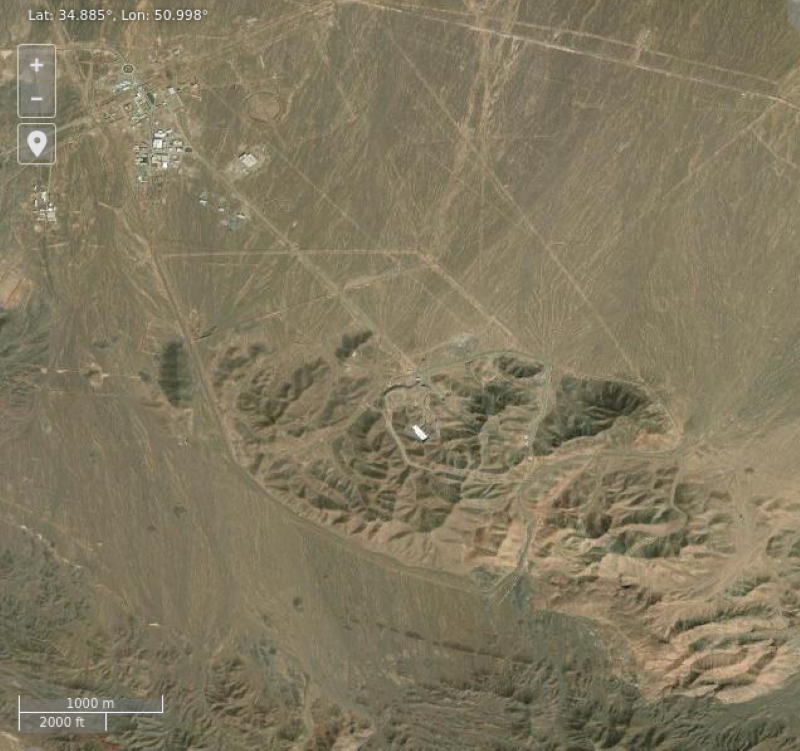 Iran-Israel
Fordow Uranium Enrichment Plant. Photo: Wikimedia Commons
Iran-Israel
Fordow Uranium Enrichment Plant. Photo: Wikimedia Commons
Iran confirms nuclear facilities were 'badly damaged' by US strikes
Iran's Foreign Ministry spokesman Esmail Baghaei has admitted that the country's nuclear facilities suffered damage due to American strikes over the weekend.
“Yes, our nuclear installations have been badly damaged,” Esmail Baghaei told Al Jazeera.
“That’s for sure because [they have] come under repeated attacks,” he said.
“I have nothing to add on this issue because it’s a matter of technical issue,” he went on, noting that the Atomic Energy Organization of Iran and other relevant agencies are addressing it.
Despite a rocky start, the fragile ceasefire between Iran and Israel remained in place on Wednesday.
The ceasefire was reached on Tuesday, which ended the 12-day war.
US President Donald Trump on Tuesday said the Iranian nuclear programme has been set back for decades following the US strikes on its facilities.
"I think basically decades," Trump was quoted as saying by BBC when asked about the nuclear programme in the country.
"I think they've had it, they just went through hell... the last thing they want to do is enrich," he said.
Amid this relative calm, the United Nations has renewed its call for a diplomatic solution to the Iran nuclear issue, warning that the objectives of the Joint Comprehensive Plan of Action (JCPOA) – and the resolution that endorsed it – remain unmet.
Addressing a planned Security Council meeting on Tuesday to try and revive the deal amid the dramatic military escalation of the past 12 days, UN political affairs chief Rosemary DiCarlo said the fragile ceasefire announced by Donald Trump overnight provided “an opportunity to avoid a catastrophic escalation and achieve a peaceful resolution of the Iran nuclear issue.”
The 2015 Iran nuclear deal – more formally known as the JCPOA and backed by the Security Council – offered Tehran sanctions relief in exchange for strict limits on uranium enrichment, stockpile levels and centrifuge use, alongside robust monitoring and verification by the International Atomic Energy Agency (IAEA).
But the accord has remained in limbo since the United States withdrew in 2018, followed by Iran’s rollbacks of its nuclear-related commitments.
With key provisions under resolution 2231 set to expire on 18 October – unless the Council decides otherwise – the UN’s top political official has warned that the window for reviving diplomacy is narrowing.
With less than four months before resolution’s remaining nuclear-related restrictions are set to expire on 18 October – unless extended by the Council – the UN’s top political official warned that the agreement’s key aims remain elusive.
Top Headlines
-
News
Major aviation boost for Kashmir: Cabinet clears development of a new Civil Enclave at Srinagar International Airport
February 24, 2026
-
News
India urges all nationals to leave Iran 'by available means' as US-Iran tension grows
February 23, 2026
-
News
Ind.AI: Sovereignty, jobs, energy and the What If?
February 20, 2026
-
News
From car diplomacy to global strategy: Modi, Macron upgrade IndiaFrance ties
February 17, 2026
-
News
Seva Teerth: PM Modi inaugurates new PMO, announces these key decisions on first day
February 13, 2026
-
News
Hero of Operation Sindoor: IAF vice chief hails Rafale ahead of mega 114-jet deal
February 11, 2026
-
News
'Govt surrendered before Trump, sold Bharat Mata: Rahul Gandhi attacks Centre over IndiaUS trade deal
February 11, 2026
-
News
Painful times in my marriage: Melinda Gates reacts to Bill Gates being named in Epstein Files
February 05, 2026
-
News
Perverse act of self-immolation: Shashi Tharoor slams Washington Post after son Ishaans layoff
February 05, 2026
-
News
Is India moving away from the Dollar? Strategic shift in foreign reserves signals a new era
February 03, 2026





